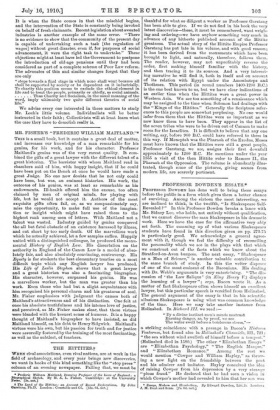THE HITTITES.t
WHEN rival associations, even rival nations, are at work in the field of archaeology, and every year brings new discoveries, we want in books of this kind something like the "stop press" column of an evening newspaper. Failing that, we must be * Frederic William Maitland, Downing Professor of the Laws of England : a B11388iographical Ske etch. By N. A. L. Fisher. Cambridge : at the University P. P5s. net.
t The Land of the Hittites: an Account of Recent Explorations. By John Garstang, Ph.D. London : Constable and Co. [12a. ad, net.] thankful for what so diligent a worker as Professor Garstang has been able to give. If we do not find in his book the very latest discoveries—these, it must be remembered, want weigh. ing and ordering—we have anyhow something very much in advance of any hitherto published account of the Hittite greatness. The actual story of the Hittite Empire Professor Garstang has put late in his volume, and with good reason ; it has been derived from the monuments which have been brought to light, and naturally, therefore, follows them. The reader, however, may not unprofitably reverse the order, first making himself familiar with the history, and then tracing it to its sources. And a very interest- ing narrative he will find it, both in itself and on account of its relation with Egypt under the Amonhoteps and Thothmes. This period (in round numbers 1400-1200 B.C.) is the one best known to us, but we have clear indications of an earlier time when the Hittites were a great power in Western Asia. We see too something of a renaissance which may be assigned to the time when Solomon had dealings with the "Kings of the Hittites." Generally the Scripture refer- ences to this people are somewhat perplexing. No one would infer from them that the Hittites were as important as we now know them to have been. They appear in the list of the seven tribes who were to be driven out of Canaan to make room for the Israelites. It is difficult to believe that any one writing, say, before 900 B.C. could have referred to them in this way. If Meneptah was the Pharaoh of the Exodus, Moses must have known that the Hittites were still a great people. Professor Garstang, we see, assigns their first downfall approximately to 1200 B.C. He mentions under the year 1255 a visit of the then Hittite ruler to Ramses II., the Pharaoh of the Oppression. The volume is abundantly illus- trated, though some of the pictures, giving scenes from modern life, are scarcely pertinent.






































 Previous page
Previous page